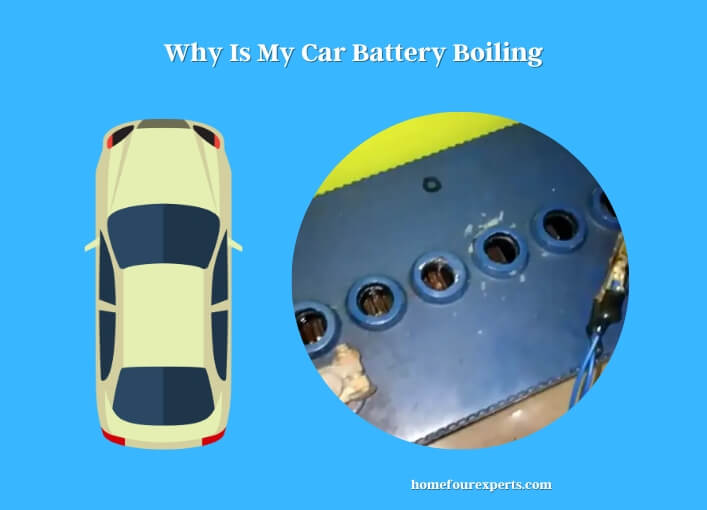Why is my car battery boiling? And why does it heat up? Is it common for a battery to overheat and boil? How can I prevent it?
There are various reasons for your car battery to boil. But some of the most common ones are- defective battery systems, old or weak batteries, overcharging, battery dry out, etc.

Battery boiling is preventable. If you have a really old battery installed in your car, it is most likely to dry out and boil. In this case, you can change your car battery so that it does not bring more hazards. And we have brought together the solutions for the battery boiling problem. Check them out below.
Why Is My Car Battery Boiling?
Your car battery may boil while you are driving or when it is parked. And the reasons for your car battery to boil can be many. It is normal to happen when you regularly use the car. Especially during the summer, the temperature can reach up to 200° F. However, this could happen for numerous reasons. And we have found them out for you. The following problems might cause your car battery to overheat-
Scorching Heat or Temperature Rise in the Engine Area
The engine produces heat when it runs. As a result, the engine area becomes heats up. This phenomenon is very common during the summer if you live in a warm climate. Combined, it affects the battery. It can also affect the engine badly.
The situation can result in overheating, battery drying out, and overcharging problems. Consequently, the battery boils over. A properly functioning cooling system and frequently filling up the coolant tank can help reduce the effect. Also, park your car under shades during summer.
Using Wrong Charger
Using an inappropriate charger can lead to battery overheating and ultimately boiling. Different types of batteries are available on the market, and each of them needs particular charging devices. Using the wrong charger or overcharging the battery can overheat the battery and make it boil. A defective deep cycle battery charger can also cause the same problem.
Overfilling
Lead-acid batteries used in cars require water fill up. This type of battery includes plates submerged in a solution of water and acid. As time passes, the battery needs a refill with distilled water. If you fill it up more than it requires, it will overflow. So, when the battery heats up for any reason, overfilling a battery leads it to boil over.
Defects in the System
A defect in the alternator can lead to battery overheating. The alternator recharges the battery. If the alternator is defective, it may supply too little or too much voltage to the battery.
Excessive voltage can lead to battery overheating. Also, a defective voltage regulator can have a similarly bad effect on your car battery. When it is faulty, it can not control the level of voltage supplied to the battery. Therefore, often the battery is overcharged, which leads it to overheat and sometimes boil.
Short Circuit
Short circuits in the battery system can lead your battery to overheat, spark, and boil. This is a common occurrence in traditional lead-acid batteries. When the positive and negative plates come in contact, a short circuit may occur. Most of the time, it happens due to the damage in the middle layer that separates the two plates. It is an internal short circuit.
When the battery terminals come into contact with a piece of metal, an external short circuit may take place. It also causes battery overheating. Since metal contact can lead to a battery explosion, you should not bring metal tools close to the battery terminals.
Old Battery
An old battery is often synonymous with a dead battery. It stops working all of a sudden without giving you prior notice. If your car battery is old and boils over whether you drive or not, these could be the reasons-
- Broken Plate: In most cars, lead-acid batteries are used. The battery includes battery plates that crumble over time. Or it can break due to accidents. The damage or deformation of the battery plates can cause your car battery to boil over. Often it can result in a short circuit or spark, and then it may boil.
- Sulfation: The lead-acid battery used in cars creates sulfation when they are being used for a long time. The electrolyte used in car batteries breaks down, resulting in battery sulfation. As a result, sulfate crystals form on the battery plates. And the current is not strong enough to break it from the plates.
Since the battery is old, it is now more resistive. Therefore, it heats up and boils over pretty quickly. Also, it requires more water than it needed before. You can not do much about an old battery. The best solution is to change it with a new one. Otherwise, you can water more frequently as per the manufacturer’s instructions.
What to Do if a Battery Is Boiling?
If you have a battery that is boiling, you must handle it with proper safety. When the battery is boiling over, it is not only steaming hot, but also it is acidic. So, you must not touch it with bare hands.
Moreover, you should replace a boiling battery as soon as you can. Contact your car mechanic if you can not handle the issue on your own. During a battery boil, first, you should find out the actual cause behind it and then take action accordingly.
8 Tips to Prevent Car Battery Overheating
Car batteries barely last for a decade unless you take proper care. The battery boils when it overheats. If you can prevent overheating, the battery should stop boiling over and over again. Some preventive measures you can take for the overheating and boiling issue are as below-
- The reason behind battery sulfation either could be lack of full recharge or watering. So, keep the battery charged and water it frequently as instructed by the car manufacturer.
- Regularly check on the battery and the connected wires. Find out if there is any defect on the battery which may result in an overheating or boiling issue. Occasionally clean the terminals and repair any damaged wire immediately.
- Keep your car battery safe from shock and vibration to prevent damages.
- Do you live in a warm climate? Do not drive your car for a long time uninterruptedly, especially during summer. The scorching hot sun easily heats up the engine, which can lead to battery overheating. Take intervals on a long drive and park your car under a shade.
- Observe the meters and gauges in your car. Also, check on the amperage and voltage of the battery if they are giving a correct reading.
- Maintain a healthy coolant level. The coolant helps to prevent overheating problems by collecting heat from the engine. Fill up the coolant tank at the recommended level. Regularly check in summer and do not exceed the maximum level.
- Fully charge the car battery before winter. In winter, it requires more battery power to run the engine. If the battery is not fully charged, then it can create additional pressure on the battery, causing it to overheat.
- Store your car or RV battery when you are not driving for a long time. Keep away from metals to prevent any occurrence.
- The coolant transfers heat to other parts of the car, like the heater. You can turn on your car heater and warm it inside. Thus some of the battery heat passes to the radiator and prevents battery overheating or boiling.
Take preventive measures and keep your battery safe from overheating and boiling issues.
FAQs About Car Battery Boiling
1. What Does It Mean When a Battery Is Boiling?
When your car battery is boiling during a charge, it is probably happening because of overcharging. Overcharging can cause your battery to boil over. This can happen due to a wrong charger or if you use a higher voltage to charge than the battery requires.
2. How Do You Fix a Boiling Battery?
A boiling battery is a dangerous battery. The bubbling acid can spill on your hand. Check out if the alternator is putting out too much voltage. If it happens due to the battery drying out, fill it up with some distilled water. Find out the possible reasons behind your battery boiling and take adequate actions.
3. What Causes a Car Battery to Get Hot?
Your car battery can get hot for many reasons. A defective alternator can overcharge your battery or provide more voltage than it needs. Besides overcharging, a short circuit can also heat up the battery. It can also overheat when the battery terminals are inserted backward.
4. What Happens if a Car Battery Overheats?
An overheated car battery can lead to a battery explosion. When a battery overheats, it dries up the internal acid. Overheating leads to battery corrosion and other problems. It also damages the wiring of the battery.
5. Why Does the Car Boil the Battery and How to Avoid It?
The reasons for the car battery to boil can be overcharging, excessive heat, a short circuit, or a defaulting alternator. Since you do not know the exact cause behind your car to boil over, find out what is the reason behind it.
Take adequate preventive measures to prevent battery boiling or overheating. Maintain a healthy battery condition, use the right alternator, water the lead-acid battery on time, and do not overcharge your battery.
Conclusion
Why is my car battery boiling? A car battery can overheat and boil for many reasons. Evaporation of the battery acid, defective alternator, heated engine bay, wrong charger- these all can be a possible reason for your car battery to boil.
Often a defective battery can cause overheating or boiling problems. We hope you found out the reason behind this. Take preventive measures to keep your car battery from boiling. Also, replace it if necessary.
About This Writer

Hi, I am responsible for the 'Homeowners Power Solutions' category. My name is Liam Jaxon and a licensed technician with 7 years of experience in vehicle batteries, electrical gadgets, and home appliances. My working experience in different residential & light commercial electrical sectors and the automobile industry helped to acquire vast knowledge in this industry.